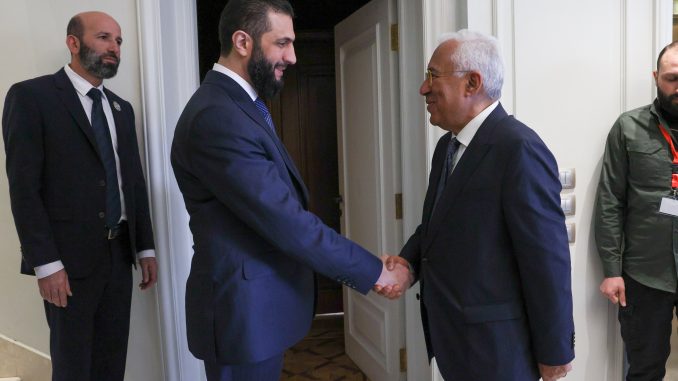Peloni: Al Shaara, aka Al Jolani, has done nothing to deserve lifting of sanctions beyond making promises of inclusive policies back up by acts of sectarian violence. This gift of stabilizing Turkey in yet another state to which it has no right reinforces the well established precedent of the US succumbing to Saudi demands.
Ahmad Sharawi | May 14, 2025
 Arab League President Costa meets then interim President of Syria (By © European Union, 1998 – 2025, Attribution)
Arab League President Costa meets then interim President of Syria (By © European Union, 1998 – 2025, Attribution)
“I will be ordering the cessation of sanctions against Syria in order to give them a chance at greatness,” said President Donald Trump on May 13 during a speech at an investment forum in Riyadh at the start of his tour of the Gulf Arab states. The next day, Trump met with Syrian interim president Ahmad al-Sharaa alongside Saudi Crown Prince Mohammed bin Salman, while Turkish President Recep Tayyip Erdogan joined by phone. Trump pushed Sharaa to join the Abraham Accords, expel foreign fighters and Palestinian terrorist organizations, and take control of ISIS detainees. Sharaa reaffirmed Syria’s 1974 disengagement agreement with Israel, expressed interest in counterterrorism cooperation, and pitched Syria as a future trade and energy hub open to U.S. investment.
Saudi Arabia has been key in brokering Sharaa’s access to Washington. The kingdom’s hosting of the Trump-Sharaa meeting in Riyadh signals Saudi ambitions to lead Syria’s integration into the region, open the door for Gulf investment in Syria, and counter Turkish influence in the country. Washington would benefit if Damascus tilts toward Riyadh, yet Ankara is far better positioned to influence Shaara due to Turkey and Syria’s geographic proximity and Turkey’s close, years-long partnership with the rebels that overthrew the Bashar al-Assad regime last December. But even if Sharaa demonstrates a preference for the Saudis, risks for the United States abound.
Sharaa’s Power Consolidation Undermines Representative Governance
Sharaa claims he is leading Syria toward a more inclusive future, but his actions tell a different story. Since taking office, Sharaa has tightened his grip on every lever of power. In March, he pushed through a constitutional declaration that handed him sweeping executive, legislative, and judicial control for the next five years.
In February, Sharaa convened a National Dialogue Conference, calling it “a platform for deliberations and consultations on our upcoming political program.” However, the event was rushed, disorganized, and excluded key voices — more of a political stunt than a serious effort at inclusion.
U.S. Secretary of State Marco Rubio put it bluntly: “Credible, non-sectarian governance is the best path to avoid further conflict.” However, so far, Sharaa has done the opposite, centralizing power and empowering a circle of Sunni Islamists with militant pasts. That is not reform. It is regime preservation.
Jihadists and Sanctioned Figures Now Dominate the Syrian Military
To unify the military, Sharaa has elevated jihadist commanders and pro-Turkish militia leaders from the Syrian National Army, a coalition of rebel groups. He continues to appoint foreign fighters as commanders of key units, defying previous U.S. demands to expel them. Sharaa has taken only cosmetic steps to address U.S. concerns, such as suspending the promotion of foreign fighters. Sanctioned warlords — such as Mohammad al-Jasem (a.k.a. Abu Amsha) and Sayf Boulad — now occupy senior roles despite their factions’ involvement in atrocities, including the March 2025 violence along the Syrian coast.
Until Sharaa proves he can build a military free of extremist actors — figures who threaten not just Syria’s future but also regional stability — Washington must keep sanctions firmly in place.
Sanctions Relief Should Proceed Cautiously, With Potential to Snap Back Into Place
Trump’s commitment to lift all sanctions sharply limits U.S. leverage over Syria, but Washington can still unwind sanctions in a responsible manner that limits a number of risks. Even in the absence of sanctions on Syria per se, individuals and entities within Syria that do business with terrorists should be subject to counter-terrorism sanctions. Washington should also carefully monitor the development of anti-money laundering and countering the financing of terrorism (AML/CFT) rules. Finally, if Shaara cannot prevent further ethnically based massacres like those that occurred this past March, human rights sanctions should remain on the table.
Ahmad Sharawi?is a research analyst at the Foundation for Defense of Democracies (FDD), where he focuses on Middle East affairs, specifically the Levant, Iraq, and Iranian intervention in Arab affairs, as well as U.S. foreign policy toward the region. For more analysis from Ahmad and FDD, please subscribe?HERE. Follow Ahmad on X?@AhmadA_Sharawi. Follow FDD on X?@FDD. FDD is a Washington, DC-based, nonpartisan research institute focusing on national security and foreign policy.



Leave a Reply
You must be logged in to post a comment.